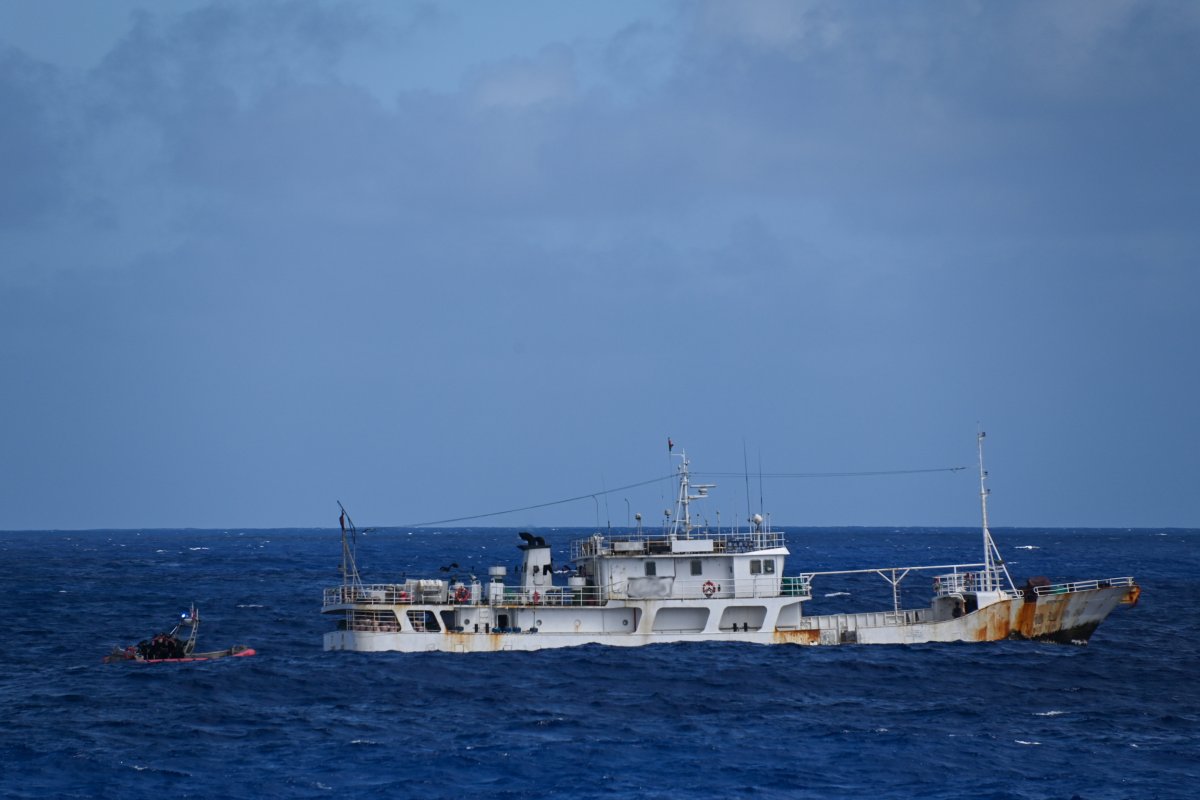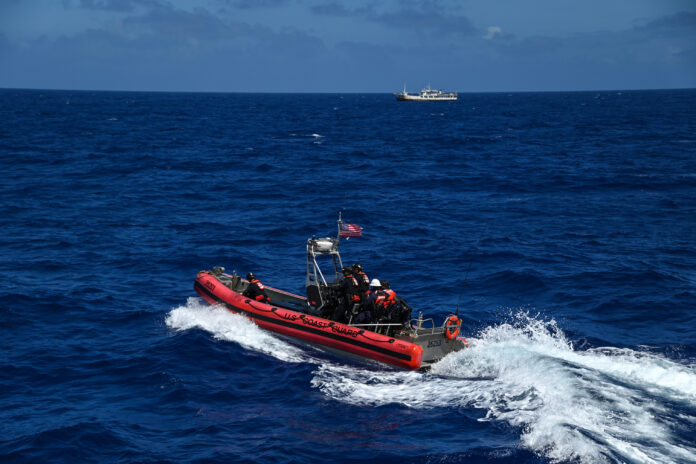The U.S. Coast Guard helped identify six Chinese ships that had broken Vanuatu fishing laws during recent patrols with the Pacific island nation’s government authorities, officials said.
Bianca Simeon, a Vanuatu maritime police inspector, said half the boats boarded during the inspection of the country’s vast exclusive economic zone had failed to properly report their catch logs, Reuters reported on Wednesday.
International maritime law grants coastal states like Vanuatu, an EEZ that extends up to 200 nautical miles, an expanse that is difficult for most small governments to regulate. Simeon said the country, which has a population of about 320,000, had not patrolled the resource-filled waters for many years.
Senior Chief Petty Officer Charly Tautfest/U.S. Coast Guard
The U.S. Coast Guard cutter Harriet Lane was joined by four Vanuatu fisheries officials for patrols in February that lasted five days, the U.S. Embassy in Port Moresby, Papua New Guinea, which also serves the Solomon Islands and Vanuatu, said on Tuesday.
“The operation enabled Vanuatu to protect its sovereignty and enforce maritime law within its exclusive economic zone,” the embassy added. During fishery boardings, the Harriet Lane “found multiple violations of Vanuatu law,” it said.
The two were working under a 2016 “shiprider agreement.” A similar joint law enforcement deal was cited in February when Coast Guards with the cutter Oliver Henry boarded two Chinese vessels in the EEZ of neighboring Kiribati, although no violations were reported.
Yakar Silas, another Vanuatu fisheries official, told Reuters that China’s distant-water fishing fleet was responsible for most of the violations in the country’s EEZ. Fines would be issued to the shipowners and their local agents, he said.
“The patrol gave the opportunity to inspect foreign vessels that are fishing in Vanuatu waters and not coming into port and offloading their catch into foreign ports, for example Fiji,” Silas told Reuters. “They are all Chinese vessels.”
The Coast Guard’s capacity-building program in the Pacific Islands is known as Operation Pacific Blue. The Harriet Lane began its mission in Samoa and later helped patrol Fiji’s EEZ.
Chinese Foreign Ministry spokesperson Mao Ning said on Wednesday that she was “not aware of the specifics” of the Vanuatu case.
“China respects the sovereign rights and exclusive jurisdiction that coastal states enjoy in their exclusive economic zones in accordance with international law,” Mao said.
The Coast Guard’s Pacific sector did not immediately respond to Newsweek‘s written request for comment. The Chinese Foreign Ministry did not answer calls seeking comment.

Senior Chief Petty Officer Charly Tautfest/U.S. Coast Guard
The Coast Guard is expanding its footprint to help curb illegal, unreported and unregulated fishing in the Pacific in response to “growing call” from local partners, the agency said in February.
“Illegal, unreported and regulated fishing accounts for roughly 20% of the world catch and up to 50% in some areas, the detrimental impacts cannot be overstated,” the Coast Guard said.
“Not only do these illicit practices pose significant threats to the world economy and nations reliant on the fishing industry, but they also wreak havoc on vital marine habitats, including coral reefs, sea floor ecosystems, and various marine species,” it said.
An intense geopolitical rivalry opposes the United States and China, in which the latter is slowly growing its own influence in the South Pacific region.
The outreach through international programs like the Belt and Road Initiative, in which Chinese bank loans fund infrastructure projects, is directly competing with decades of foreign aid traditionally supplied by the U.S. or other Western allies.
Beijing’s ability to win friends in the Global South is a matter of concern for officials in Washington, especially when relationships are forged in strategic regions on America’s periphery.
Uncommon Knowledge
Newsweek is committed to challenging conventional wisdom and finding connections in the search for common ground.
Newsweek is committed to challenging conventional wisdom and finding connections in the search for common ground.


